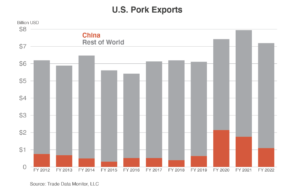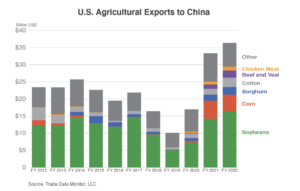United States corn and soybean farmers could lose billions of dollars in annual production value in the event of a potential new tariff-induced US-China trade war, according to a new…
China Imports Record Volume of Soybeans in Jan.-Feb., While Warning U.S. on Policy Strategy
Earlier this week, Reuters writer Dominique Patton reported that, “China, the world’s top oilseed buyer, imported a record volume of soybeans for the first two months of the year, as buyers stocked up in anticipation of healthy demand and over worries of a delayed harvest in Brazil.
January and February imports reached 16.17 million tonnes, customs data showed on Tuesday, up 16.1% from a year earlier, and the highest for the two months combined since at least 2008, according to Reuters records of customs data.
“China’s General Administration of Customs combines data for the first two months of the year to smooth out distortions caused by the week-long Lunar New Year holiday, which fell this year in late January.”
🇨🇳#China imported a record 16.2 million tonnes of #soybeans in Jan & Feb, up 16% YOY (Jan/Feb '22 held prior record). Strong January shipments from USA amid Brazilian delays helped lift China's Feb imports. March arrivals may be less impressive after Brazil's slower Feb. pic.twitter.com/P7rdCto42N
— Karen Braun (@kannbwx) March 7, 2023
Patton noted that, “Brazil’s combined January and February soybean sales fell 31% year from a year earlier to an estimated 6 million tonnes, consultancy AgRural said last week.
“China’s meat demand, and therefore the animal feed ingredient soymeal, is expected to rise this year after Beijing abandoned strict zero-COVID measures in late 2022.”
Meanwhile, The USDA’s Foreign Agricultural Service (FAS) indicated in a report this week, “Livestock and Products Semi-Annual,” that, “The People’s Republic of China (PRC) decision to end its zero-COVID policy restrictions is expected to improve demand for both pork and beef products in 2023. However, Brazil’s decision to suspend beef exports to China at the end of February following a suspected bovine spongiform encephalitis (BSE) detection could impact supply as alternative origin suppliers may not fully bridge the potential supply gap in 2023.”
The FAS report also indicated that, “Hog production (pig crop) in 2023 is forecast to decline by 2 percent year on year (YOY) to 700 million head due to, on average, lower sow inventories in 2022 compared to 2021.”
“In 2023, pork imports are expected higher by nearly 4 percent YOY to 2.2 MMT on stronger consumer demand following the end of COVID restrictions, but further growth will be curbed by higher domestic production,” FAS said.

More broadly on the U.S., China relationship, Washington Post writer Christian Shepherd reported on Tuesday that, “China and the United States are careering toward an inevitable collision, Foreign Minister Qin Gang said Tuesday, a day after Chinese leader Xi Jinping made a rare direct accusation that Washington was trying to contain China.
“Together, the statements underscore the dire state of bilateral ties between the world’s two biggest economies, a month since a rogue balloon brought a sudden and surprising end to efforts to ‘put a floor’ under the relationship.”

Also Tuesday, Financial Times writer Kathrin Hille reported that, “China’s foreign minister has warned of a clash with the US unless Washington ceases its attempts to contain Beijing, highlighting the Chinese Communist party’s concerns over escalating tension between the rival superpowers.
‘If the US doesn’t hit the brakes and continues to barrel down the wrong track, no amount of guardrails can prevent the carriage from derailing and crashing, and there will surely be conflict and confrontation,’ Qin Gang said on Tuesday.
The FT article added that, “The foreign minister’s remarks, made at a press conference during the annual session of China’s rubber-stamp legislature, followed a highly unusual direct criticism of the US by China’s leader Xi Jinping.
“‘Western countries, led by the US, are implementing all-round containment, encirclement and suppression against us,’ Xi told delegates of China’s top political advisory body on Monday, according to state media. While Xi frequently uses nationalist rhetoric, he rarely mentions the US directly in criticising Washington’s policies.”





